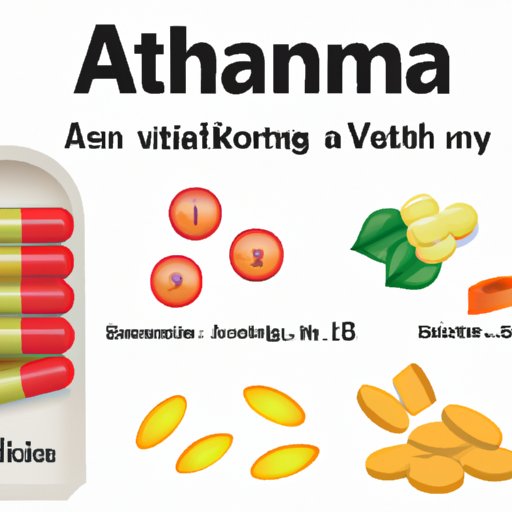
Introduction
Vitamin A is a vital nutrient that provides numerous health benefits for the body. As an essential nutrient, it plays a crucial role in promoting good health by supporting proper bodily functions, immune system efficiency, and other essential body processes. In this article, we will explore the many benefits of Vitamin A, its potential dangers when deficient, and how to incorporate more of it into your diet. This article is intended for those seeking a better understanding of Vitamin A and its importance in maintaining overall wellness.
What is Vitamin A?
Vitamin A is a fat-soluble vitamin that is essential for maintaining proper bodily functions. There are different forms of Vitamin A, including retinol, retinoids, and carotenoids, such as beta-carotene. Retinol is the active form found in animal sources of Vitamin A, while beta-carotene is found in plant sources.
The human body cannot produce Vitamin A by itself, so it must be obtained through diet or supplementation. Some excellent dietary sources of Vitamin A include dairy products, eggs, liver, and green leafy vegetables.
The Health Benefits of Vitamin A
Improved Eyesight
Vitamin A is most commonly known for its ability to improve eyesight. This is because the retina of the eye requires Vitamin A to function correctly, specifically the part called rhodopsin, which is responsible for sensitivity to light. Vitamin A deficiency can lead to poor vision, night blindness, and even blindness in severe cases.
Boosts Immune System Function
Vitamin A plays a vital role in the proper functioning of the immune system. It helps the body produce white blood cells, which helps fight off infections and diseases. Without enough Vitamin A, the immune system can become compromised, leaving people vulnerable to illnesses and infections.
Healthy Skin and Cell Growth
Another essential function of Vitamin A is the promotion of healthy skin and cell growth. It aids in regulating the growth and division of skin cells while also promoting skin cell turnover. This promotes a healthy complexion and reduces the risk of skin damage and premature aging.
Surprising Ways Vitamin A Can Improve Your Wellness
Fighting Inflammation and Reducing the Risk of Certain Types of Cancer
Vitamin A is also associated with reducing inflammation in the body, making it a useful nutrient in fighting off chronic inflammation-induced diseases like arthritis and asthma. Additionally, studies have shown that Vitamin A may help lower the risk of certain types of cancer, including lung and colon cancer.
Supports Reproductive Health
For women, Vitamin A is an essential nutrient during pregnancy and is essential for fetal growth and development. It plays a critical role in the development of vital organs and body systems, such as the lungs, heart, and eyes. Vitamin A also supports normal reproductive processes, including ovulation and healthy fetal development.
The Dangers of Vitamin A Deficiency
Vision Impairment
Vitamin A deficiency can lead to vision impairment, particularly in low-income countries where access to Vitamin A-rich foods is limited. A severe deficiency can lead to blindness, known as xerophthalmia, which is prevalent in parts of Southeast Asia and Africa.
Increased Vulnerability to Infections and Diseases
A lack of Vitamin A can weaken the immune system, leaving people more vulnerable to infections and communicable diseases. This is especially detrimental to children, who have a higher risk of Vitamin A deficiency and may develop severe complications.
Incorporating More Vitamin A in Your Diet
If you are looking to incorporate more Vitamin A into your diet, there are many options available. Some excellent dietary sources of Vitamin A include dairy products, eggs, meat, fish, and plant sources like sweet potatoes, kale, carrots, and spinach. Additionally, taking Vitamin A supplements is another option. However, it is essential to consult with your healthcare provider before starting any supplementation regimen, as taking too much can be toxic.
Conclusion
Vitamin A is a crucial nutrient that plays many important roles in maintaining overall health and wellness. From supporting proper immune system function to promoting healthy skin and vision, Vitamin A is essential for healthy living. Ensuring you get enough Vitamin A through diet and supplementation is essential for promoting good health and avoiding potential dangers of deficiency.





